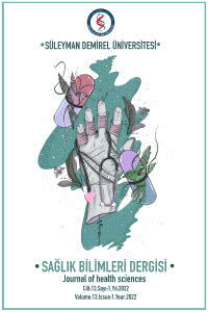Streptokinaz ile tedavi edilen akut miyokart infaktüsünde gelişen retroperitoneal hematom: Olgu sunumu
Akut miyokart infaktüsü, retroperitoneal hematom, streptokinaz
Spontaneous retroperitoneal hematoma after treatment with streptokinase for acute myocardial infarction: a case report
___
- ISIS-2 Collaborative group. Randomized trial of intravenous streptokinase, oral aspirin, both, or neither among 17187 cases of suspected acute myocardial infarction: ISIS-2. Lancet 1988; 2(8607): 349-60.
- Keeley EC, Boura JA, Grines CL. Primary angioplasty versus intravenous thrombolytic therapy for acute myocardial infarction: a quantitative review of 23 randomized trials. Lancet 2003; 361: 13-20.
- Karabulut Z, Doğan T, Aşık M, Ergun T, Lakadamyalı H, Moray G. Enoksaparin İlişkili Spontan Retroperitoneal Hematom. Türkiye Klinikleri J Cardiovasc Sci 2007; 19: 186-189.
- Griebling TL, Chang PJ, Loening SA, Williams Rd. Percutaneous thrombolysis of an infected retroperitoneal hematoma with urokinase. J Urol 1995; 154(4): 1477.
- Yilmaz MB, Akin Y, Güray U, Kisacik H, Korkmaz S. Spontaneous rectus muscle hematoma following streptokinase therapy for acute myocardial infarction: a case report. Int J Cardiol 2002; 84(1): 101-103.
- Yalta K, Yılmaz MB, Karadaş F. Spontaneous massive intraperitoneal hematoma accompanied by acute severe anemia after low-dose thrombolytic therapy. Arch Turk Soc Cardiol 2007; 35(6): 370- 372.
- Kaynar M, Pişkin MM, Güven S. İdiyopatik retroperitoneal hematom. Olgu sunumu. Selçuk Ünv Tıp Dergisi 2010; 26(4): 146-147.
- ISSN: 2146-247X
- Yayın Aralığı: Yılda 3 Sayı
- Başlangıç: 2010
- Yayıncı: Zehra ÜSTÜN
Hemşirelikte Eleştirel Düşünme
Yurdanur DEMİR DİKMEN, YASEMİN YILDIRIM USTA
HEMŞİRELİKTE ELEŞTİREL DÜŞÜNME: LİTERATÜR İNCELEMESİ
Yurdanur Demir, Yasemin Yıldırım Usta
Larinks kanserli erişkin bir hastada dil kökü kistik lenfanjiomu: Olgu sunumu
Mustafa DOĞAN, Fatih ÜNAL, Murat YARIKTAŞ, Giray AYNALI, Metin ÇİRİŞ
Sağlık eğitimi alan bir grup öğrencinin empatik eğilim ve becerisi
ÇAĞLA YİĞİTBAŞ, SÜLEYMAN ERHAN DEVECİ, Yasemin AÇIK, A. Tevfik OZAN, A. Ferdane OĞUZÖNCÜL
Kronik ürtiker ve hepatit C virüs infeksiyonu İlişkisi
Endodontide ağrı ve analjezik kullanımı
Bulem UREYEN KAYA, Emre ÇİÇEK, Halil AŞCI
Ortoreksiya nervosa: beslenme ve diyetetik bölümü kız öğrencileri için bir risk mi?
Eyüp BÜYÜKKAYA, Mehmet Fatih KARAKAŞ, Mahmut GÜNGÖR, Hanifi BAYAROĞULLARI, Adnan Burak AKÇAY
Beslenme ve diyetetik bölümü kız öğrencileri arasında görülen ortoreksiya nervosa riski
Sağlık Yüksekokulu ve Sağlık Meslek Lisesi Öğrencilerinin Umutsuzluk Düzeyleri
